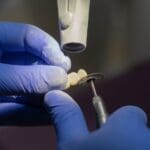On a day-to-day basis, you don’t likely think about the complex inner workings of your teeth. You know to brush and floss them daily and often associate them with the dentist, but what else is there to know about teeth?
The short answer to this question is A LOT. Just like any part of your body, your teeth are very much alive. These 10 interesting facts will make you rethink the role your teeth play in relation to your oral and general health.
1. You Have Four Types of Teeth, All of Which Serve a Unique Purpose
When you open your mouth wide, you’ll be able to see four main types of teeth, including:
- Incisors — These include a total of eight teeth in the front center (four on the bottom and four on the top). These are the foods that help you bite into your food.
- Premolars — These eight teeth help you crush your food, supporting digestion. With their flat-biting surface, they can easily tear through all types of food.
- Molars — As the largest teeth in your mouth, they serve a similar purpose to premolars. They will help grind and further break down food.
- Canines — You have four canine teeth in total (which are the sharp teeth outside of your incisors). Because they’re the sharpest teeth of them all, your canines will help you tear through food.
If the complex evolution of teeth is interesting to you, “Evolution’s Bite: A Story of Teeth, Diet, and Human Origins” is a great read.
2. Your Enamel Is VERY Hard (But Still at Risk of Damage)
Although most people think about their bones as the strongest part of their body, tooth enamel is actually the hardest. However, just because it is incredibly hard does not mean that damage cannot occur. Since your teeth are susceptible to acid and the build-up of bacteria, it is imperative that you take a proactive approach to protect the tooth’s enamel. After all, once your enamel is gone, it’s gone for good.
3. Your Teeth Are Like Fingerprints
If you watch crime shows, you may have seen investigators analyzing dental records. That’s because each and every individual has a unique tooth print. The size, shape, and placement of each tooth are all one-of-a-kind.
4. Your Tooth Isn’t Visible to the Naked Eye
Most people are aware that their teeth have roots (think back to when you lost your first wiggly tooth). However, many are unaware that only two-thirds of their teeth are visible. This means that a full third of each tooth hides below your gum line (and this is also why you must take a number of steps to prevent gum disease and decay).
5. Plaque Doesn’t Waste Any Time
Approximately four hours after brushing, plaque will begin to form. Made of millions of bacteria, plaque is a soft and sticky film. Once you eat, the bacteria that are in your mouth feed on the available sugars. This creates acid that wears away at your enamel (this can also be the beginning of a cavity). This is the reason it’s important to brush and floss, as you can more effectively remove plaque below the gum line.
6. Your Oral Health Impacts More Than Your Smile
We briefly mentioned caring for your heart above, and if you are someone who is at risk for heart disease, knowing this fact is crucial. Studies have shown that those living with moderate or advanced gum disease experience a much greater risk of future heart complications.
The common link is bacteria. Bacteria from the mouth circulates through the bloodstream, and once that bacteria reaches the heart, it can cause significant inflammation. In turn, this increases your risk of atherosclerosis (clogged arteries), stroke and an infection of the heart’s inner lining.
7. There Are Options When You Knock Your Tooth Out
If you ever knock out your tooth, place it in a glass of milk. This will actually help your tooth survive longer. However, the most critical step is to see your dentist immediately (preferably within 30 minutes).
8. Not Everyone Has Wisdom Teeth
As presented at the annual meeting of the American Association for the Advancement of Science, not everyone has wisdom teeth (up to 35 percent of the population is missing wisdom teeth). Experts strongly believe that thousands of years ago, there was a random mutation that suppressed the development of wisdom teeth.
9. Your Mouth Is a Sea of Saliva
In your lifetime, you will produce more than 25,000 quarts of saliva. This fluid not only protects your teeth from bacteria but also actively supports digestion.
10. Teeth and Gum Care Is Centuries-Old
The first toothbrushes were chewable twigs. Our ancestors used everything from crushed eggshells to bone-handled, boar bristle brushes. The invention of the modern toothbrush didn’t happen until the late 1930s, following by the invention of the electric toothbrush in 1954.
These facts show how fascinating your teeth truly are, so please take care of them. After all, the Spanish writer Miguel de Cervantes said it best, “Every tooth in a man’s head is more valuable than a diamond.”










